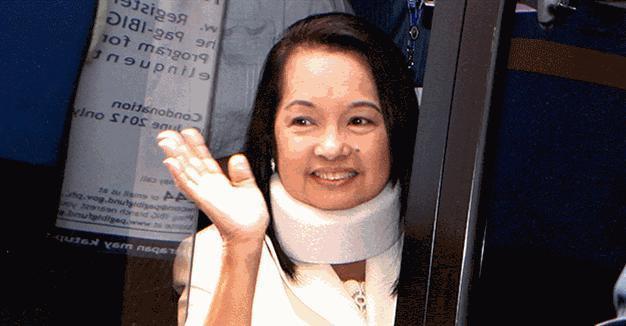Philippine top court dismisses graft case against ex-leader Arroyo
MANILA - AFP

In this Feb. 23, 2012 file photo, former President Gloria Macapagal Arroyo waves to the crowd from the window of her van as she came to a court arraignment for election sabotage at the Regional Trial Court in suburban Pasay City south of Manila, Philippines. AP photo
The Philippine Supreme Court on July 19 threw out a long-running corruption case against jailed former president Gloria Arroyo and ordered her immediate release after almost five years in detention.
The 69-year-old, who was in office from 2001-2010, could be freed later July 19 from the Manila government hospital where she has been held since her November 2011 arrest, her lawyers said.
The case against Arroyo and a co-defendant was dismissed "for insufficiency of evidence", Supreme Court spokesman Theodore Te told reporters.
Arroyo was accused of stealing 366 million pesos ($8.8 million) in state lottery funds meant for charity programmes while she was in office.
"The court... orders the immediate release from detention of said prisoners," Te said, reading from the court ruling.
Arroyo had refused to submit evidence during the trial, which was held at a special anti-graft court, claiming the charges against her were weak.
She later requested the Supreme Court dismiss the entire case.
Arroyo was initially arrested on charges of electoral sabotage for allegedly conspiring with election officials to rig 2007 senatorial elections.
She was granted bail for that case in July 2012 after the court -- while not dismissing the charge -- ruled the evidence against her was weak.
But the corruption case against her was lodged the same year, keeping her in detention.
Despite being detained, Arroyo has won a seat in the House of Representatives in the past two elections.
However, she has appeared to be in poor health, wearing a neck brace in court appearances for what her doctors describe as a spinal disease.
Arroyo was elected vice president in 1998 and became president after a bloodless popular revolt cut short the term of the elected president, Joseph Estrada.
In 2004 she won a controversial presidential election, but was forced to deny widespread allegations that she had stolen her victory at the ballot box.
Her term was marred by allegations of corruption and election cheating which helped propel her successor and arch-critic Benigno Aquino, who ran on an anti-corruption platform, to power.
